Today week we take on a doomsday future! We haven’t done one of those this season. So, what would happen if all the active volcanoes in the world erupted at the same time? The short answer is: bad things. The long answer is, well, you’ll have to listen to the episode!
First we talk to Jessica Ball, a volcanologist, who walks us through the different types of eruptions, what make something an active volcano, and just how bad ash is. Spoiler: it’s really bad. It gums up engines, cuts up your lungs, and is so heavy that it can collapse buildings.
But the destruction of a massive volcanic eruption doesn’t stop there. Oh no. Then Ball tells us about the ways in which volcanoes can actually impact the climate. In fact, in 1815, a single volcanic eruption at Mount Tambora caused the entire Northern Hemisphere to experience “A Year Without a Summer,” resulting in famine, death, and Mary Shelly’s Frankenstein. (You’ll have to listen to the podcast to get that particular story.)
So how does one live through this kind of apocalyptic event? To find out, I called up two people who, unlike me, would probably survive: Megan Hine and Pat Henry. Megan and Pat are both sort survival experts, but they go about it in really different ways.
Megan is an adventurer and wilderness expedition leader. She takes people out into the middle of nowhere, and trains them no how to survive. People like Bear Grills, the man of the Discovery Channel show Man vs. Wild. Bear has called Megan “the most incredible bushcraft, climbing and mountain guide you’ll ever meet.”
Pat is a little bit different. Pat is a prepper, someone who is actively preparing today for a disaster that might come tomorrow. Pat is the founder and editor of a website called The Prepper Journal, which has pretty much everything you need to know about prepping, should you be worried about, say, all the volcanoes in the world going off at once.
Oh and Pat isn’t his real name. He uses a pseudonym, so that nobody knows that he has two years worth of food stored up. So when something terrible does happen, he doesn’t have to turn his unprepared friends and neighbors away.
Both Megan and Pat said that the first way to survive is by being lucky. Don’t live or be near a volcano. But after that, surviving 1,500 volcanic eruptions is like surviving any other terrible thing. You’ll need food, water, shelter, medicine. You’ll have to fight off other humans. And you’ll probably be surprised by what you can do, when push comes to shove.
And we end the episode with a note about who you want in your little gang of survivalists. You’ll be surprised who’s actually a good addition to that team. Stay tuned to the end for that.
Also! Right now I’m running a little survey for listeners. Tell me a bit about yourself, please. Thanks!
Flash Forward is produced by me, Rose Eveleth, and is part of the Boing Boing podcast family. The intro music is by Asura and the outtro music is by Broke for Free. The voices for this week’s future scene were provided by Suzanne Fischer, Eddie Guimont, Guillermo Herrera, Wendy Hari, John Olier, Caroline Sinders and Kevin Wojtaszek whose name I think I might have finally pronounced correctly this time. The episode art is by Matt Lubchansky.
If you want to suggest a future we should take on, send us a note on Twitter, Facebook or by email at info@flashforwardpod.com. We love hearing your ideas! And if you think you’ve spotted one of the little references I’ve hidden in the episode, email us there too. If you’re right, I’ll send you something cool.
And if you want to support the show, there are a few ways you can do that too! We have a Patreon page, where you can donate to the show, we also have an Acast+ membership you can join or you can just donate once. Information on all of those things at Flash Forward dot com slash Support. If none of that is in the cards for you, you can head to iTunes and leave us a nice review or just tell your friends about us. Those things really do help.
That’s all for this future, come back next time and we’ll travel to a new one.
▹▹▹▹▹▹▹▹▹▹▹▹▹▹▹▹▹▹▹▹▹▹▹▹▹▹▹▹▹▹▹▹▹▹▹▹▹▹▹▹▹▹▹▹▹▹▹▹▹▹▹▹▹▹▹▹▹▹▹▹▹▹▹▹▹▹
TRANSCRIPT
Hello and welcome to Flash Forward! I’m Rose, and I’m your host. A quick note before we begin this week: I’m running a little survey about the show so that I can make it better. As you all probably know, I make this show… alone! So I don’t really have any editors and I don’t really get any feedback on what’s going on. So I’d love to know what you think about a few things, and what directions you’d like to see this show go. The survey will also help me find advertisers that are more relevant to your interests. So, if you don’t mind, head to flashforwardpod.com/survey and fill it out. It should take less than five minutes, and I really appreciate it.
Okay, on to the future! This week we’re going to start in the year 2021.
>> music fades out
News announcer: A series of volcanic eruptions in Alaska earlier today has much of the state and its Canadian neighbors wondering WHAT could possibly be happening. The state is home to 130 volcanoes, and at our last count 45 of them had shown some activity over the past two days.
YouTube clip
News announcer: We interrupt this broadcast for a breaking news announcement. Reports are coming in from across the globe that the eruptions in Alaska this morning were just the tip of the iceberg. Volcanic activity has now been confirmed at over 200 volcanoes across the globe, and some of these eruptions have already destroyed several cities. Reports from the ground say the infamous mount Vesuvius erupted just a few hours ago, and local reports suggest that the 600,000 people living below the volcano had no time to escape.
Stay tuned as we gather more on this story.
YouTube Clip
News announcer: New updates in the strange, worldwide volcanic eruptions. In the Democratic Republic of the Congo, a volcano named Nyiragongo has reportedly wiped out nearly a million people and their homes.
YouTube Clip
News announcer: Another volcano has erupted today, this time in Indonesia. Mount Marapi reportedly blew its top just thirty minutes ago, sending a Pyroclastic flow through several local villages. The Indonesian government has ordered nearly 60,000 people to evacuate, but reports coming in suggest that the order may have come too late.
News announcer: Scientists at the United States Geological Survey called and emergency press conference today to discuss the ongoing, worldwide volcanic activity. As of today’s latest count, 438 volcanoes have erupted since Friday, but the scientists warn that the ash clouds and destruction may have cut off communication from remote areas, and the number may be higher. The researchers said they still have no clues as to why these volcanoes are all erupting at once. Humanitarians across the globe are already warning of incredible destruction and loss of life.
President: Hello my fellow Americans. I am speaking tonight not from the White House, where I would normally be, but from an emergency bunker. I’m sure I don’t need to explain why. I apologize for the low quality of this broadcast. But I want you to know that our scientists and officials are working around the clock to provide relief to the communities impacted by this incredible disaster.
I also must ask that you do not panic. That you do not let fear and confusion overcome you. That you do not shun your neighbors, your friends, our fellow Americans. Whatever is happening right now knows no boundaries, it knows no “good neighborhoods” and “bad neighborhoods.” It cannot tell if you are rich or poor, black or white. And I ask that y
I cannot explain why this is happening, or how long it will continue. But I can tell you this: you are not alone. And I will leave you with the words of two past leaders of this nation.
George Washington, the great founder of our nation, once said: “Let it be told to the future world…that in the depth of winter, when nothing but hope and virtue could survive…that the city and the country, alarmed at one common danger, came forth to meet [it].”
And Barack Obama, 44th President of the United States called upon those words in 2009. rr
CLIP: America. In the face of our common dangers, in this winter of our hardship, let us remember these timeless words. With hope and virtue, let us brave once more the icy currents, and endure what storms may come. Let it be said by our children’s children that when we were tested we refused to let this journey end, that we did not turn back nor did we falter; and with eyes fixed on the horizon and God’s grace upon us, we carried forth that great gift of freedom and delivered it safely to future generations.
Thank you. God bless you and God bless the United States of America.
Thank you. God bless you and God bless the United States of America.
▹▹
Okay, so, today’s future is one in which every single active volcano on Earth erupts, at the same time. We haven’t done an apocalypse scenario this season, so, here you go. But before we get to how bad this would be, let’s back up a little bit, and talk about volcanoes and what makes something an active volcano.
JESSICA01: OK. So yeah so the scientific definition of an active volcano is one that’s erupted in the last 10000 years and 10000 years is sort of an arbitrary marker it’s the beginning of the Holocene which is one of the you know geologic time periods that we define things by
That’s Jessica Ball and she’s a vulcanologist at the US Geological Survey.
JESSICA01: there are about fifteen hundred volcanoes around the world that have erupted in the last 10000 years and then there are about 500 of those that have erupted in historic time and this goes back to you know some number of years B.C. But basically that means that there’s some some record of them.
So fifteen hundred volcanoes, all going off at the same time. Also there might be more than 1,500, that’s just how many we know about.
JESSICA03: It does count some undersea volcanoes but the caveat there is that we don’t know about a lot of them. A lot of the bathymetry in the in the sea floor mapping that’s gone on has just been you know and maybe in the last century or so. And we we know that there are more out there that are probably active but they just haven’t erupted Yeah and they might even erupt without us knowing about them.
Now, not all volcanoes or eruptions are the same. Jessica says there are a couple of types of eruptions.
JESSICA09: Oh there are definitely different types. So an eruption type depends on a lot of things. It depends on the tectonic setting so where the volcano is located it depends on the type of magma. So if you have you know stickier magma involved in the eruption it’s more likely to be explosive whereas if you have magma that’s not quite as sticky it might flow instead. It depends on how much gas is involved it depends on the you know any number of factors. A lot of the you can sort of group them into categories of like explosive or a effusive but you don’t have one eruption type just everywhere.
Some volcanoes flow slowly — if you’ve ever been to the Hawaiian islands, some of those are the slowly seeping kind. But others blow fast, in more of the classic KABOOM style eruption you usually think of with volcanoes.
JESSICA11: The term that we use is ballistics but you could also use the term lava bombs. It’s exactly what it sounds like.
Lava bombs! Very cool except if you get hit with one. In which case you probably die. So some volcanoes blow, some seep, and some can do both. But if they all went off at the same time, what would happen?
JESSICA14: Oh then that would be a very bad day. It would be. I can imagine it would be catastrophic in any number of ways.
Okay so let’s get more specific. First, you have just the destruction right near the volcanoes. Which is no small thing.
JESSICA14: I mean it you know the people near the volcanoes First of all there will be a lot of dead people very close to. Because if say you had a bunch of explosive eruptions you have things like pyroclastic flows which are really fast clouds of rock and ash and gas that are very hot. You cannot run those you can’t outdrive the you know you might get away from a jet or something.
So, a pyroclastic flow is like this giant wall of hot gas and rock that comes out of a volcano. These flows can move as fast 450 miles an hour and reach temperatures as hot as 1,830 degrees Fahrenheit. So, if that’s coming for you, there’s pretty much nothing you can do. You’re dead. And pyroclastic flows, depending on the volcano, can travel for over a hundred miles. So, if you are even remotely close to one of the volcanoes that really goes kaboom, you’re probably dead.
And that’s a lot of people. About 3 million people live near Mount Vesuvius, 130 million live on the island of Java, which is also home to 45 volcanoes. In Mexico, Popocatepetl, named after the Aztec word for smoking Mountain, rises out of the ground near both Mexico City and the nearby Puebla. Together, that’s over 10 million people. Those are just a couple. So if all the volcanoes go off at once, we’re looking at millions and millions of people dead, just like that. As a baseline.
JESSICA14: I mean all sorts of really nasty things and if you had something like 500 volcanoes doing that all at once it would suck.
But it doesn’t end there. That’s just the beginning. When a volcano erupts, it often sends ash into the air. And volcanic ash is actually tiny tiny pulverized particles rock. And rock, is heavy. As you probably know. Which means that ash, when it falls back down out of the sky, is also heavy
JESSICA35: it’s basically like somebody has to just dump the sand box on you Yeah it’s the ash can collapse buildings because it’s so heavy. So if it piles up on the roof or if it you know if there’s enough of it will just flatten things.
Not only does ash collapse buildings, it also makes flying totally impossible. And it’s not just because you can’t see through it, these tiny rock particles actually shut down plane engines.
JESSICA19: if you get even a little bit of that into a plane engine what happens because it’s basically glass is that it will melt and then re solidify on your engine parts and and that that is obviously an extremely bad thing.
This actually happened to a plane in Alaska in 1989. The flight was going from Amsterdam to Tokyo, and it was making a stop in Anchorage. On the way it flew through a cloud of volcanic ash from Mount Redoubt, which is in Alaska. Inside the engines, the ash actually turned into a glass coating, which made the plane’s temperature sensors fail and caused all four engines to shut down. Eventually the pilots were able to regain control of the plane, turn the engines back on, and land, but all of the engines had to be replaced before it could fly again.
And it’s not just plane engines that this can happen to, any engine can be totally destroyed by volcanic ash.
JESSICA29: Yeah you go you know you basically down to like a bicycle or a mule or something.
And unlike, say, ash from a forest fire which just washes away eventually, volcanic ash doesn’t. It sticks around and it’s really hard to get rid of.
Not only that but the ash in the air is really really bad to breathe. Because breathing in tiny rock particles is really bad for your lungs.
JESSICA33: Well it’s sort of similar in the sort of immediately Yeah I mean it’s painful but the problem with ASH is that it’s it’s ground up silica basically glass so you can get silicosis out of it. This is sort of something that people in factories run into more than the rest of us do. Yeah you definitely want to be wearing some sort of respirator to go out in it.
JESSICA34: Exactly yeah so you get you there’s there’s a lot of research about why it’s so bad but you get glass into your lungs and your lungs respond by doing various different things to it like you know they might send send your immune system after that or they might scar or there might be all sorts of things you might get pneumonia so your lungs my fluid fill with fluid. It’s very nasty stuff. If you start breathing it in. It is horrible.
So, to recap, millions of people dead immediately. Cities that aren’t destroyed by the immediate pyroclastic and mud flows will then face fallout from the ash that can collapse their buildings. You can’t go outside without a gas mask because breathing in all the ash will cut up your lungs. And you can’t go anywhere using a vehicle with an engine, because the ash in the air will gum it up. Oh also, you’ve probably lost a lot of your communication channels too. Ash can ruin satellite dishes and block radio waves.
Okay, that’s all bad. But… it gets worse! ecause all these volcanoes going off would not only destroy anybody within radius, and then potentially cripple folks for thousands of miles, it could actually change the climate on Earth.
JESSICA17: Yeah that’s that’s sort of what people sometimes call a doomsday scenario that would be extremely bad come.
And we’ve seen something sort of like this before. In 1815 a volcano in Indonesia called Mount Tambora erupted. The Mount Tambora eruption is one of the most powerful volcanic eruptions in recorded history. It was GIGANTIC. Scientists have this way of classifying volcanoes, and Mount Tambora is a VEI-7. Now I’m not going to get into the details of the ranking system but for comparison, the eruption at Mount Vesuvius was a VEI-5, and the scale is logarithmic, which means that the Mount Tambora eruption was 100 times more powerful.
So the eruption started on April 5th, 1815. There was a huge boom sound that was heard from hundreds of miles away. Then on April 10th, people in Sumatra reported hearing what they thought was the sound of firing guns. They actually thought that their neighbors were being attacked by cannons. It was actually Mount Tambora, and Sumatra is 1600 miles away from Mount Tambora. And they could hear the eruption. Accounts from the time say things like, the whole mountain was turned into liquid fire. It rained pumice stones, and then ash.
Now, researchers estimate that 9.8 cubic miles of pyroclastic rock was ejected from Mount Tambora, weighing about 10,000 tonnes.
But Tambora isn’t impressive just because the eruption was so huge. It’s also notable because of the impact it had not just locally, but globally. The 1815 eruption in Tambora can be seen in global climate records.
JESSICA 17: we had what was called A Year Without a summer when mount Timboro erupted and that was one very large volcano and it put so much you know ash and gas into the atmosphere that it actually lowered global temperatures by almost an entire degree Celsius
This dip in temperatures meant that crops actually failed and there were food shortages all across the Northern Hemisphere. In North America there was this constant reddish dry fog, that never seemed to go away. That winter was incredibly harsh and an early frost killed most crops in Massachusetts, New Hampshire, Vermont and upstate New York. On one farm in New York they recorded snow on June 7th and 8th.
In Europe it was largely the same, heavy rain and cool temperatures ruined crops like wheat, oats and potatoes. There was looting and riots in the UK and France. In Switzerland, the government actually declared a national emergency. Ireland suffered a Typhus epidemic that killed far more people than it might have without the famine. Crops failed in China to, and farmers who starving and desperate for cash, planted poppies, which led to a boom in the global opium trade. Millions of people around the world starved. All from just one volcano.
And here’s one last fun fact about the impact of the Mount Tambora eruption: that summer, the summer of 1816, is when Mary Shelly wrote Frankenstein. Shelly was supposed to be on a summer vacation in Switzerland. But it was cold and rainy, like we just mentioned, and her and her companions they spent a lot of time inside. And to pass the time, they entertained themselves with a ghost-story-writing contest. And thus, Frankenstein was born. So, you can thank a volcanic eruption, for Frankenstein, I guess, kinda. And for a whole lot of death and suffering too.
And that was just one volcano. If one huge eruption can cause that kind of devastation, think about what 1500 could do.
So, how do you survive something like this? When we come back, we’ll hear from two people who might actually make it through this apocalypse, and how they plan to do it. But first, a quick break.
[[AD]]
Okay so this week we’re going to an apocalyptic future. All 1500 active volcanoes on Earth have erupted at once. This is … not good. Very not good. Thankfully, it’s never going to happen. Or, if it does, we’re going to have even bigger problems anyway.
JESSICA21: Oh no no no no. Yes I guess the comment I would have on that is that eruption triggers are so complicated sometimes like they may even be individual to a particular volcano that there’s I can’t imagine that there’s one thing that could happen to the earth that would set off a lot of volcanoes all at once except maybe you know like a catastrophic asteroid strike in which case we’d have other problems.
But what if this did happen? Who would survive? Probably the next two people we’re going to talk to: Megan Hine and Pat Henry. Megan and Pat are both sort survival experts, but they go about it in really different ways.
Megan is an adventurer and wilderness expedition leader. She takes people out into the middle of nowhere, and trains them on how to survive. People like Bear Grills, the man of the Discovery Channel show Man vs. Wild. Bear has called Megan “the most incredible bushcraft, climbing and mountain guide you’ll ever meet.”
MEG04: Yeah because I think that with wilderness survival, and like a true survival situation you know where you’ve actually been in a plane crash in a natural disaster. You just don’t know how you’re going to react until you’re in that situation. You know you know how strong you are who you are confronted with that situation.
Pat is a little bit different. Pat is a prepper, someone who is actively preparing today for a disaster that might come tomorrow.
TPJ13: Well it depends I mean usually it’s you know it’s more general I guess the thing that I if I had to say I had one thing that was kind of worried about more than any other thing it would probably be an economic collapse because you know when everyone is you know impacted by the world economy there’s nowhere to turn. So I think that that is something that could really you know disrupt our world probably but maybe not on the scale of volcanoes going on but certainly you know when you have as many people as we have that are dependent on the system if the system crashes it’s going to be horrific.
Pat is the founder and editor of a website called The Prepper Journal, which has pretty much everything you need to know about prepping, should you be worried about, say, all the volcanoes in the world going off at once.
Now, the first step in surviving this kind of volcano explosion is, well, just to be lucky.
MEG06: Yeah I mean it is really it’s really interesting that if all the world. OK no I think it’s like a.. Initially it’s not a surprise because if you’re unlucky and you’re within the radius of cocaine a going off from the gas it hit you on the fly hits you and takes you out. It’s then kind of you know it’s just it’s just bad luck then. But if you’re lucky enough to survive that situation if this goes for any sort of scenario if you’re lucky enough to survive this is that situation immediate situation it’s then off to that then when the real test of your grades and any previous experience that you have in life that you can draw on that will help you further yourself.
So where’s the luckiest place to be?
JESSICA24: The best place to be I would say would be somewhere really far in the interior of a continent that had a decent water supply of some kind. Yeah I was thinking that Mongolian Well actually no Mongolia there’s a lot of volcanoes up there too. It would be hard to avoid those and I can’t say Antarctica because they also have volcanoes yet there are a couple down there
Weirdly, in the short term, the best place to be might actually be on a cruise ship in the middle of the ocean. They have food, they have medical supplies, and they have clean water. And they’re not near any volcanoes, probably. Of course, eventually you have to come back to land. But at least you’d survive the initial devastation.
But beyond luck, both Megan and Pat said pretty similar things about how you might want to prepare and react to something this terrible: get yourself a stash of food, clean water, and supplies.
MEG09: So you know the very first thing if you’re in a survival scenario is that you meet the physiological needs or they do the very basic needs that the human body needs the bodies on psychological basis purely physiological things like oxygen. I think we can’t do that without oxygen food water shelter sleep those sorts of things that are out there. Without those, your body is just going to go downhill so your initial challenge when you first find itself into a scenario like this is to meet those physiological needs.
TPJ07: Well usually we try to focus on, or I try to focus on a couple common areas everyone needs. Everyone needs water and everyone needs shelter. And then you start getting into things like you know hygiene and sanitation medical care and security. So now you’re alive shelter certainly in New York in the winter time you don’t want to be in a situation where you have no power and no heat so you want to make sure that you can keep yourself warm. And usually that again addressed with you having layers having warm clothing. Being able to keep yourself for shelter from the wind in the and in the rain. Unless your entire apartment complex disappears that’s usually not a problem. And then hygiene making sure that you do keep you keep yourself clean so that common common diseases that are found after you know disasters like cholera you know don’t don’t take you down so that. Making sure that you’re not you know getting exposed to sewage you know human waste that kind of thing. And then security in New York it’s it’s even more difficult than other parts of the world but usually we advocate some kind of firearm if you have a firearm. Certainly self-defense classes tasers pepper spray you know some things that you can send people if you need to because in almost every major disaster the services are going to be crippled you’re not going to be able to call the police you know you’ll be able to call you know the fire department they’re going to be overwhelmed.
Pat is totally ready for this by the way. He has almost two years worth of food and supplies stored up.
TPJ12: I do. I do for my family I probably have a good 18 months worth of food stored away. Well I have a house. You know I’ve got to get a pantry and then there’s me now stashed under the bed freeze dried food under the bed. But you know you start looking at fifty pound bags of rice and the ten pound bags of beans and then five gallon jugs of you know buckets of hard red winter we you know you can you can really start amassing a lot of lot of calories in a relatively short you know footprint.
Once you’ve got your basic needs met, then you start to deal with the psychological fallout. And with a volcano there are some special things to worry about: it’s going to be dark.
MEG10: Over a long term scenario like this, it does become more of a psychological challenge. If you’ve met all your physiological needs you do have access to food or you will need to keep stockpiling clean water as well you know with a fallout from the volcano has polluted your water that you need to find a way to clean it. But psychologically I think if the sky is much darker as well because of all the ash in the atmosphere and sky above us I think that lack of sunlight as well I mean things like that if you’re not getting the Vitamin D that your body needs to survive can start inhibiting calcium absorption which is most adults who probably survive but but children who are more vulnerable could have a real problem if they’re not getting the basement they need but something else that is somewhat triggers is this serotonin cycle which happens which happens. And if that cycle that whack it is not getting from market requires it can become quite irregular and this can actually cause things like depression and anxiety which you see often in mice or Scandinavian countries where they only have a few hours of sunlight a day over the winter. So the psychological side of things is a very very important thing to look at and trying to you know trying to sort out the self-talk and it’s really interesting.
Now, Megan says that there are two kinds of people in these survival situations: people who can take it, and people who can’t.
MEG11: What I find so fascinating with psychology it’s viable is that why do some people give up in a survival situation while they give up and they they have no will because the thought of it got my will to fight whereas some people will do whatever it takes and it’s just so interesting that the difference in psychology between those two camps of people
But even if you are a survivor, you then have to figure out how to deal with the other people who have also managed to survive. What if they find you? Do you band together? Do you go out on your own? Megan says that in survival situations, it really is like the TV shows, people do… kind of terrible things.
MEG17: So it’s about a situation a family self and you know survival is just very primal by you the very cells of your body fighting for survival and I want to survive and it is quite amazing quite scary as well. Like what you actually be capable of doing and achieving and also doing to other people if you need to just to survive.
And Meg says that if she did have a good setup, with food and water, she’d keep that a secret.
MEG18: I wouldn’t I wouldn’t be telling anybody and if I had set myself up for sustainable living I definitely wouldn’t be telling anybody about it.
Now, remember that, Pat does have a store of food and water and supplies stored up. And, he actually does keep it a secret. You see, Pat is not Pat’s real name.
TPJ17: And it is not my real name.
He uses a pseudonym for all his online prepper discussions. Partially because he doesn’t want potential employers to find his online stuff and maybe think he’s a little out there. But mostly because if things do get bad, he doesn’t want anybody to know that he’s got food and water saved up.
TPJ18: Well it was just me it was just more that I didn’t want it to impact me. You know my my work relationship so they want to and I want anyone to take what I was advocating something out that was you know common sense and hold that against me in terms of employment and you know going back to those OPSEC or those dreamy and principals you certainly don’t want to know your friends neighbors and the things that I talk about and I’m I’m pretty honest about everything that I personally done and planned for myself on my site. You know I didn’t want to be that guy who was faced with you know 20 of your friends coming over or something you know really bad happens and saying hey we know you’ve got food let us in.
In fact, in prepper lingo there’s actually a word for this.
TPJ08: Yeah absolutely and that you know we call it the gray man concept of the gray man theory where you want to look just like everyone else you don’t want them to know that you know you’re armed or you have food or you know that you know you have a nice place to stay you want to stay you know kind of under the radar you don’t want to stand out you want to blame Dan and certainly there’s there’s other cons you know concepts like OPSEC or operational security we kind of co-opted that from the military but don’t let anyone know about your preps because you could certainly become a target of some of the desperate enough.
Even Pat’s friends don’t know that he’s a prepper.
TPJ16: I really played close to the vest. I mean if anyone asks me you know there’s there. You know I guess there are several levels that you know you could go through if people ask me if I have food stored I probably wouldn’t share that. But you know I mean I do have my there every day carry items that you know are you know I’m going to have a knife get a flashlight. I’m usually carrying a concealed weapon not that I tell anybody about that. But you know there’s a certain level certain levels of information I would share freely with friends. You know like I would tell my friends I have a concealed carry license or you know I do have guns I’m not going to tell them I have a years worth of food. But you know you just kind of have to take a look at the person and you know share whatever you think is appropriate.
But if all the volcanoes go off, Pat will probably be okay. You and me, eh, probably not so much. We’ll probably need some help, and need to find other humans to work with to survive. And Megan said one other thing that, I thought was interesting. When these volcanoes go off, and you find yourself trying to band together with a useful group of other humans, you probably want a doctor, a farmer who can help you grow crops, someone who’s good at hunting, that kind of stuff. And if a Hollywood actor wanted to join you, you’d probably say no. How useful is an actor going to be? But Megan actually works with actors a lot, taking them out into the wilderness so they can prep for their roles on screen as rugged adventurers. And she says that there’s something about actors, that make them really good survivors.
MEG03: I think I think like from a survival side of things a lot of it is very mental and it’s amazing how I act because it is so focused that you know they fought for survival. Like maybe in a different way you know in the wilderness. But still if I think that the Bible in my what a cutthroat industry so their mental attitude is usually spot on.
MEG03b: Yeah I mean it is so awesome to see because their industry they cut try to make a fight get to the top and you know remain at the top you know the things that they need to do on both like a physiological level on a psychological level. It’s just that it’s so interesting and I think you know you can use the wilderness very much is like so the means of explaining why people are the way they are or how they’ve got a situation they’ve got to
So, if Brad Pitt asks to join your roving band of post-volcanic-apocalypse humans, say yes.
That’s all for this apocalyptic future! If you want more on volcanoes, survival tips, prepping and more hea to Flashforwardpod.com where as usual we’ll post links to more information. And while you’re there, you can fill out the survey I mentioned! Flashforwardpod.com/survey. Please please please fill it out it will be a huge help to me. Thank you!
Flash Forward is produced by me, Rose Eveleth, and is part of the Boing Boing podcast family. The intro music is by Asura and the outtro music is by Broke for Free. The voices for this week’s future scene were provided by Suzanne Fisher, Eddie Guimont, Guillermo Herrera, Wendy Hari, John Olier, Caroline Sinders and Kevin Wojtaszek (Why-Tas-Ick). The episode art is by Matt Lubchansky.
If you want to suggest a future we should take on, send us a note on Twitter, Facebook or by email at info@flashforwardpod.com. We love hearing your ideas! And if you think you’ve spotted one of the little references I’ve hidden in the episode, email us there too. If you’re right, I’ll send you something cool.
And if you want to support the show, there are a few ways you can do that too! We have a Patreon page, where you can donate to the show, we also have an Acast+ membership you can join or you can just donate once. Information on all of those things at Flash Forward dot com slash Support. If none of that is in the cards for you, you can head to iTunes and leave us a nice review or just tell your friends about us. Those things really do help.
That’s all for this future, come back next time and we’ll travel to a new one.

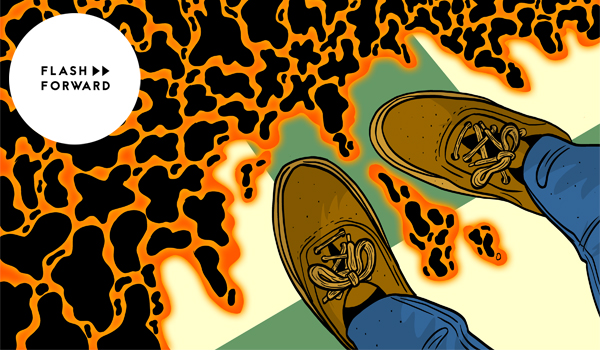
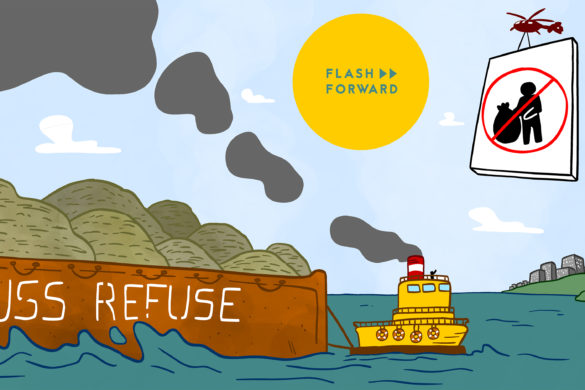
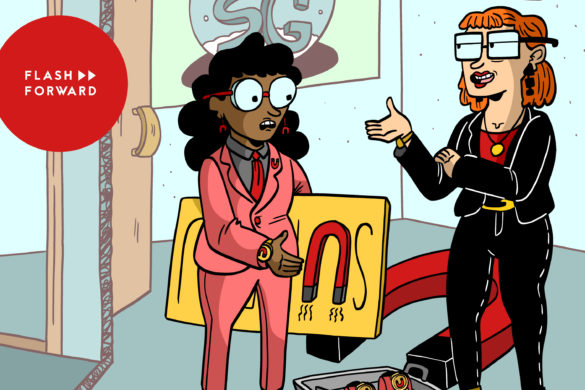
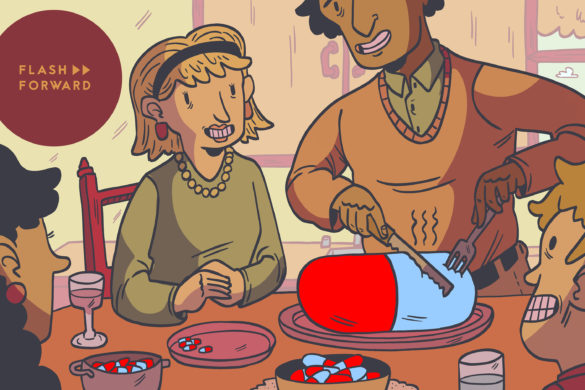
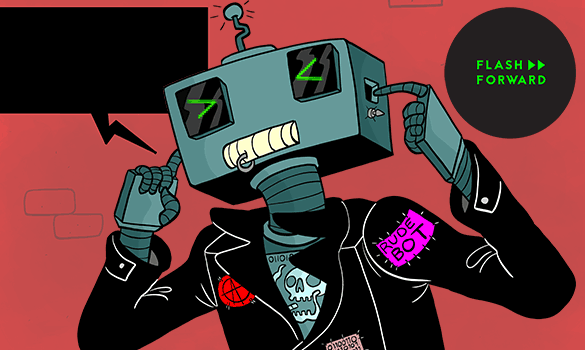
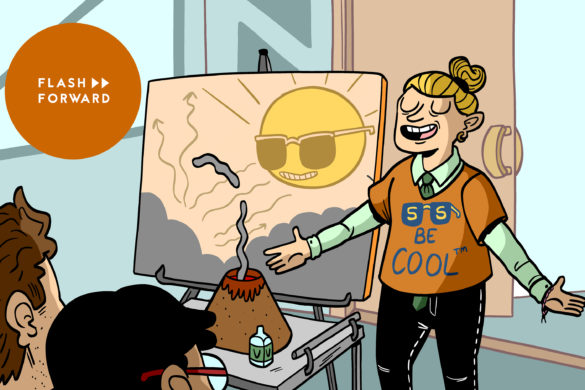
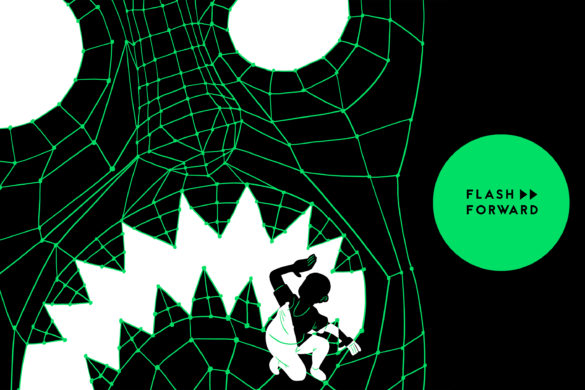

14 comments
[…] ▹▹ Full show notes […]
[…] That’s the topic of this episode of Flash Forward. […]
What is the music during the sponsor break in the middle of the show? I love it.
[…] during the Twitter discussion someone pointed me to the Flash Forward podcast that recently delved into the exact same topic! In my haste (never do things in haste, folks! Lesson: #nevertweet), I lambasted the podcast for […]
[…] during the Twitter discussion someone pointed me to the Flash Forward podcast that recently delved into the exact same topic! In my haste (never do things in haste, folks! Lesson: #nevertweet), I lambasted the podcast for […]
[…] during the Twitter discussion someone pointed me to the Flash Forward podcast that recently delved into the exact same topic! In my haste (never do things in haste, folks! Lesson: #nevertweet), I lambasted the podcast for […]
[…] during the Twitter discussion someone pointed me to the Flash Forward podcast that recently delved into the exact same topic! In my haste (never do things in haste, folks! Lesson: #nevertweet), I lambasted the podcast for […]
[…] during the Twitter discussion someone pointed me to the Flash Forward podcast that recently delved into the exact same topic! In my haste (never do things in haste, folks! Lesson: #nevertweet), I lambasted the podcast for […]
[…] through the Twitter dialogue somebody pointed me to the Flash Forward podcast that lately delved into the exact same topic! In my haste (by no means do issues in haste, people! Lesson: #nevertweet), I lambasted the podcast […]
[…] during the Twitter discussion someone pointed me to the Flash Forward podcast that recently delved into the exact same topic! In my haste (never do things in haste, folks! Lesson: #nevertweet), I lambasted the podcast for […]
[…] during the Twitter discussion someone pointed me to the Flash Forward podcast that recently delved into the exact same topic! In my haste (never do things in haste, folks! Lesson: #nevertweet), I lambasted the podcast for […]
[…] during the Twitter discussion someone pointed me to the Flash Forward podcast that recently delved into the exact same topic! In my haste (never do things in haste, folks! Lesson: #nevertweet), I lambasted the podcast for […]
[…] Listen to Kaboom here. […]
[…] had its longest eruption since 2018. We did an episode a few years ago about what would happen if all the volcanoes in the world erupted all at once. Thankfully that’s still not happening, but right now is not really a great time for additional […]